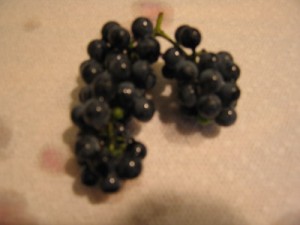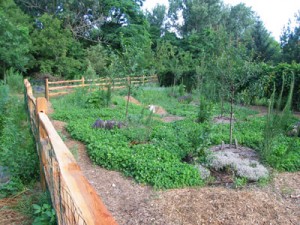Fall Waning Blood Moon
Yesterday I dug potatoes. It was the first time I’d done that save for a few new potatoes I dug during the growing season. It was wonderful. You loosen the soil with a spading fork then dig around hunting for buried treasure. Each time I came up with a potato I felt great.
A garden combines several satisfactions. The first is co-creative as you care for the soil and the seeds, then the plants as they mature. As with the bees, it is a mutual endeavor, the gardener and the plant world. The garden itself yields  intellectual puzzle after intellectual puzzle. What’s going on with that plant? How do I improve the soil? How do I keep the dogs out? (ooops. sorry.) Solving those puzzles is part of the fun.
intellectual puzzle after intellectual puzzle. What’s going on with that plant? How do I improve the soil? How do I keep the dogs out? (ooops. sorry.) Solving those puzzles is part of the fun.
Then, too, the garden has an aesthetic. Flowers add color, but so does the blue green kale and the purple and green of the egg plant. The beauty has a seasonal dimension, too, as the wonder of germination gives way to maturation. Each plants fruits then add yet another layer: tomatoes in red, yellow, orange and white, potatoes white and covered with soil, purple and white egg plants, beans with purple and yellow pods, graceful carrot and parsnip fronds.
Toward the end of the growing season those vegetables planted for storage and preservation then come into the house for canning, freezing and drying. As the snow storms come, they will fill in for the fresh vegetables eaten straight from the garden.
The act of harvesting is so primal I wouldn’t doubt our response to it swims in our genes. Carry in a wicker basket filled with ripe tomatoes, squash, cucumber, carrots, beans, egg plant, greens and the planning and digging and nurturing all makes sense. In a physical, basic way.
Eating of course is the satisfaction most apparent and is nothing to disregard, but it comes late in the process.
For those of us who find decay a fascinating part of the natural process there is another satisfaction. The reduction of the plant bodies themselves to compost returns nutrients to the soil and completes the cycle.
There is too one last satisfaction. As the snow swirls outside and the temperatures are far, far below survivability for any vegetable, I can plan next year’s garden with colorful seed catalogs. This includes the February and March and April sowing of seeds for plants to transplant into that very garden.
So, take that Rolling Stones, I got my satisfaction.

 intellectual puzzle after intellectual puzzle. What’s going on with that plant? How do I improve the soil? How do I keep the dogs out? (ooops. sorry.) Solving those puzzles is part of the fun.
intellectual puzzle after intellectual puzzle. What’s going on with that plant? How do I improve the soil? How do I keep the dogs out? (ooops. sorry.) Solving those puzzles is part of the fun.
 mentioned where Rigel opened the truck gate. There is, though, a follow-on. While gnashing my teeth about the escapes and to allow Vega and Rigel some outside time, I reversed field and put them inside the fence we put up to keep them out of the orchard. Did you follow that?
mentioned where Rigel opened the truck gate. There is, though, a follow-on. While gnashing my teeth about the escapes and to allow Vega and Rigel some outside time, I reversed field and put them inside the fence we put up to keep them out of the orchard. Did you follow that?